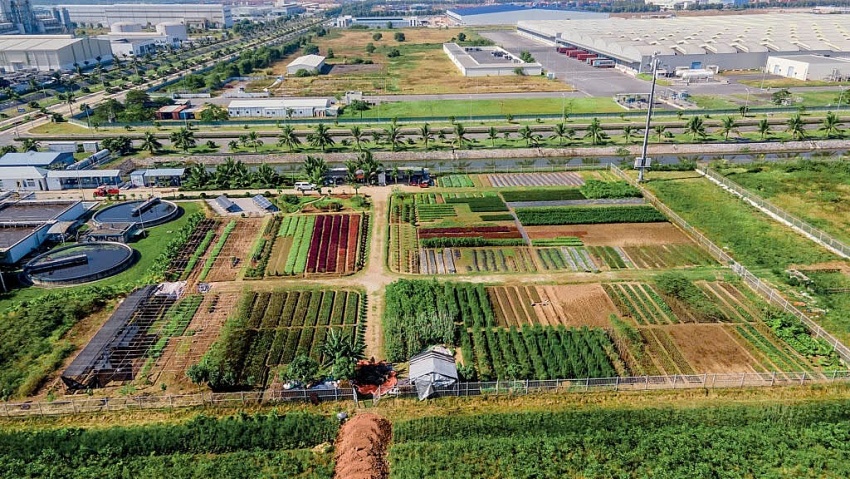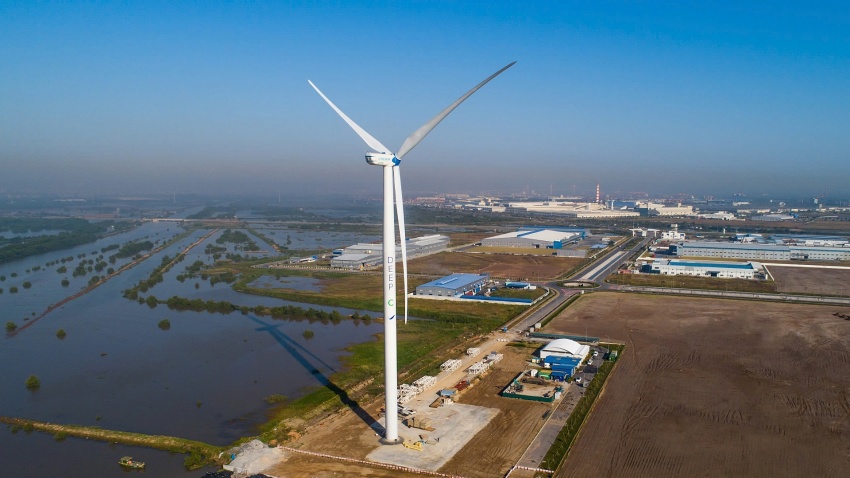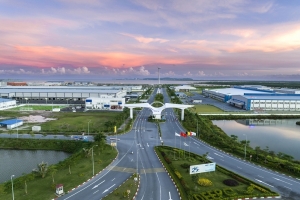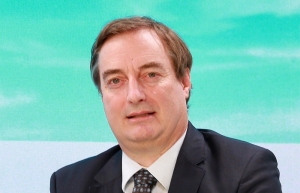The trend of building large-scale ecological industrial zones at DEEP C
Produce cleaner and use resources more efficiently
In the context of Vietnam actively moving towards achieving net-zero emissions by 2050, the industrial real estate sector plays an important role in promoting a green economy. Developing green and ecological industrial parks (eco-IPs) associated with a circular economic model, clean production, no pollution, and economical and efficient use of resources is increasingly becoming a mainstream trend.
 |
Industrial zones (IZs) with large land funds and favourable geographical locations hold great potential for transforming and developing eco-IP models. With a diverse ecosystem of businesses from many industries, these IZs become laboratories to test and replicate new initiatives on clean production, industrial biotechnology, and circular economy.
DEEP C IZs is currently developing land of 3,400 hectares spread across five IZs in Haiphong city and Quang Ninh province. These areas are all seamlessly connected, creating a large ecosystem to apply the eco-IP model; attracting more than 170 projects in production and logistics with a total capital of $7.5 billion.
Between 2020 and 2024, with financial support from the Swiss government, the Ministry of Planning and Investment continues to coordinate with the United Nations Industrial Development Organization to implement the project "Implementation of eco-industrial parks in Vietnam according to the approach from the Global Eco-Industrial Park Programme".
On August 21, this project technical team conducted a resource efficiency and clean production (RECP) assessment for 19 enterprises and factories at DEEP C.
Accordingly, there were 139 RECP opportunities related to saving electricity, fossil fuels and water. The IZs have implemented 53 RECP opportunities (38 per cent), plans to implement 33 RECP opportunities (29.2 per cent), and 53 RECP opportunities have not been implemented.
DEEP C has saved VND19.3 billion ($803,000) per year from implemented and planned RECP solutions, with a total potential savings of VND61.5 billion ($2.56 million) per year; Reduced electricity consumption by 1,828MWh per year including renewable energy opportunities, with a total potential savings of 27,950 MWh per year; Saved 5,554 GJ per year out of a total potential of 105,193 GJ per year; Reduced water consumption by 90,323 cu.m per year out of a total potential of 122,298 cu.m per year; Reduced greenhouse gas emissions by 1,502 tonnes out of a total potential of 28,327 tonnes CO2 per year.
In 2020, DEEP C achieved almost half of the indicators of the international framework for eco-IPs. With the support of the IP Development Level Project by the end of 2023, DEEP C had achieved 83 per cent of the indicators of the international framework for eco-IPs and has the potential to reach 100 per cent in the following years.
Also in 2023, 15 customers in DEEP C IZs implemented RECP solutions to efficiently use water resources and optimise energy. These efforts saved approximately 5.8 million kWh of electricity, 90,000 cu.m of water, and reduced 10,588 tonnes of CO2 equivalent.
For example, Tesa Haiphong Co., Ltd., a secondary investor in DEEP C IZ, was the first unit in the IZ to successfully build wadi concepts in the infrastructure area. A wadi is a dry riverbed or valley that helps mitigate flood effects during periods of bad weather.
“The journey to an eco-IP is not an easy journey but one of hard work, seriousness, and great responsibility to the community,” Bruno Jaspaert, CEO of DEEP C IZs stated.
Building an eco-IP is not only difficult, requiring not only perseverance, effort and time but also finance, Jaspaert added.
“The difference between normal investment and sustainable investment is time. Therefore, we hope that the Vietnamese government can consider preferential policies for eco-IZs, such as extending land lease terms for infrastructure investors who successfully build them,” he said.
 |
| The wind turbine is designed as a symbol of DEEP C IZ in Haiphong |
ESG reporting as a strategic tool
In July, DEEP C published its latest annual sustainability report, which serves as an important tool for measuring, monitoring, evaluating, and planning sustainable development strategies for its IZs. It was also the first IZ developer in Vietnam to apply international reporting standards, making operations transparent and setting a clear sustainable development roadmap.
"Currently, Vietnam is not ready to meet these standards fully. But when investors come to DEEP C, there are many parts of the work that we have prepared for them, so they can include that content in the report. The key point is investors do not come to DEEP C because we offer the cheapest land rental price,” Jaspaert explained. "Investors come to us without having to negotiate to reduce prices, they come to us because we are greener, we meet the requirements that investors are looking for.”
DEEP C has implemented carbon certification and sustainable development initiatives, and investors focus on production. Investors can consider participating in DEEP C initiatives such as registering to participate in a renewable energy programme, or participating in its farm project or waste recycling and reprocessing chain.
Industrial real estate is witnessing a strong shift towards sustainability, drive by the demand of global trend investors. Being at the forefront of this trend helps DEEP C not only create economic value but also actively contribute to building a sustainable future for Vietnam.
 | DEEP C Industrial Zones remain a reliable investment location The DEEP C Industrial Zones (IZ) complex – based in Haiphong city and Quang Ninh province – initiated 21 new projects last year with a total capital value of $970 million, including those for vehicle manufacturing and component production for the renewable energy industry. |
 | Vietnam is ready to make a statement with eco-IPs Vietnam is heading towards sustainability in its economic performance. Bruno Jaspaert, CEO of DEEP C Industrial Zones, talked to VIR’s Linh Le about the transformative journey towards sustainability in Vietnam’s business ecosystem, and DEEP C’s pivotal role in this evolution. |
 | Breakthroughs within reach for Haiphong’s development This year is deemed essential for Haiphong to ramp up efforts towards successful implementation of goals set in the 16th Haiphong Party Congress Resolution for the 2020-2025 tenure. |
 | Coastal IZs provide ideal base for logistics firms Lach Huyen International Port is the largest deepwater seaport in northern Vietnam, capable of receiving ships with a capacity of up to 14,000 twenty-foot equivalent units (TEUs). |
 | DEEP C Haiphong 3 IZ offering alluring prospects for industries The new DEEP C Haiphong 3 complex aims to woo pivotal projects worth hundreds of millions of US dollars. |
What the stars mean:
★ Poor ★ ★ Promising ★★★ Good ★★★★ Very good ★★★★★ Exceptional
Related Contents
Latest News
More News
- Saigon Centre gains LEED platinum and gold certifications (February 12, 2026 | 16:37)
- Construction firms poised for growth on public investment and capital market support (February 11, 2026 | 11:38)
- Mitsubishi acquires Thuan An 1 residential development from PDR (February 09, 2026 | 08:00)
- Frasers Property and GELEX Infrastructure propose new joint venture (February 07, 2026 | 15:00)
- Sun Group led consortium selected as investor for new urban area (February 06, 2026 | 15:20)
- Vietnam breaks into Top 10 countries and regions for LEED outside the US (February 05, 2026 | 17:56)
- Fairmont opens first Vietnam property in Hanoi (February 04, 2026 | 16:09)
- Real estate investment trusts pivotal for long-term success (February 02, 2026 | 11:09)
- Dong Nai experiences shifting expectations and new industrial cycle (January 28, 2026 | 09:00)
- An Phat 5 Industrial Park targets ESG-driven investors in Hai Phong (January 26, 2026 | 08:30)

 Tag:
Tag:


























 Mobile Version
Mobile Version